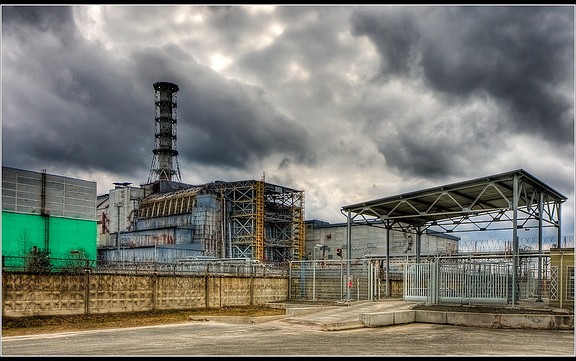
Entrance to the Chernobyl nuclear reactor, now entombed in concrete. Today's Fukushima disaster is not another Chernobyl, but could they together point us to a better way? (Photo by Timm Suess/Flickr)
A plume of radioactive blather has spread around the world from the Japanese nuclear meltdowns, stripped of information and logic (presumably by pre-radiation), seriously affecting the thought processes of millions. The reporting and punditry stimulated by the chaotic failure of the Fukushima Daichi nuclear power complex is far more notable for what it does not include that for what it does. And the most astonishing absence of all is the lack of a mention of any rational remedy for the awful risks we have to take to satisfy our insatiable appetite for cheap electricity. I’ll suggest a remedy momentarily, but first a couple of observations about the verbal emissions. And omissions.
How many times do the government officials and politicians of the world have to watch the crashing and burning of a Baghdad Bob (Saddam Hussein’s information minister Mohammad Saeed al-Sahhaf, who achieved the standing of global idiot by proclaiming on TV that the US invasion of Baghdad had failed minutes before American tanks arrived at his studio) before they get the point? Refusing to convey bad news does not prevent panic, it causes panic; pretending everything is OK when it patently is not does not preserve your credibility, your job or your government, it is more likely to destroy them all at once.
At a time when its people desperately needed accurate information, the Japanese government provided bland assurances that everything was under control. Or was about to be. And then, over and over again, had to return to the podium a few hours later to admit that everything had just gotten much worse, but was almost under control. The resulting loss of public confidence will in all probability lead to the removal of the current government along with the other debris left in the wake of the earthquake and tsunami.
At a time when the rest of the world wanted accurate information, it received instead a great deal of misinformation and hype. This was of course in large part a result of the pretenses of the Japanese government and those of Tokyo Electric Power, the operator of the plant. But it was also a result of the need of the cable channels to fill endless hours with talk even though they had no information. One result was the constant evocation of Chernobyl, almost always without the qualifications required by any comparison (Chernobyl involved the explosion of a runaway nuclear reactor while it was in operation; Fukushima’s reactors had all been shut down immediately after the earthquake. And the Chernobyl reactor had no containment building to prevent, or at least limit, the spread of radiation; all the Japanese reactors do.)
But here is the real stunner. In all these hours and days of chatter, from people increasingly obscure and removed from center stage, there have been no substantive suggestions for emerging on the other side of the dilemma that requires risking the survival of the human species in order to keep it supplied with cheap electricity. You would think that the stress imposed by the vast vacuum of unfilled airtime would allow a few good ideas to surface, if only by random chance. But as far as I know, it didn’t happen.
Instead, the industry-inspired mantra rolled on: if you’re going to replace nuclear power plants, you have to replace them with something that does what nuclear power plants do, and since there is no such thing, you can’t replace them. There were only a couple of minor variations, such as, okay then, we’ll just keep on with coal or natural gas; or, hey, let’s go all out building wind and solar “farms” which, with their vast installations and attendant transmission lines promise a new bonanza for the same industries that brought us Fukushima.
And why, pray, is there no one speaking up for the one approach that holds out a hope for the future? Where are the advocates of the decentralization of energy production? What if we took hold of one concept — that from now on, we will produce our energy where we use it — and applied it rigorously to new construction and retrofitting? What if we could accept that yes, this approach will apply some limits to what we can do (not as many as you think) but will not impose the ultimate penalty of the destruction of life as we know it?
We have the technology to do this. It is not a one-size fits all, just-flick-the-switch technology, but it is there, in fuel cells, in small wind- and water-driven turbines, in modest arrays of solar panels. Decentralizing power would create and preserve millions of jobs. Undertaking it would lift the pall of impending doom that darkens every thought of our future. It could transform the horrors of Three Mile Island, Chernobyl and now Fukushima from harbingers of doom into signposts on the road to a better future.
Why does such a prospect have no advocates?
Related Articles:
Fuel Cell Offers to Save World: World Says No Thanks
Solar “Farms” Keep us in the Dark
Renewable is not Sustainable if it’s Industrial
“Why does such a prospect have no advocates?”
Because, there are no obscenely high profits to be made!